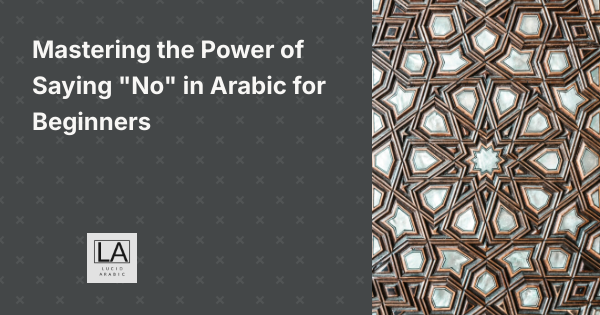Learning a new language can be fun and empowering, and one of the most essential words you’ll need to know early on is “No” in Arabic. Not only does it help you express boundaries, but it also introduces you to the sounds and structure of the Arabic language. Whether you’re traveling, talking to new friends, or learning Arabic for work, saying “No” is a key phrase that can help in countless situations. Let’s dive into how to say it, use it, and practice it effectively.
Arabic Word for “No”
In Arabic, the word for “No” is “لا”, pronounced as “laa”. It’s a short, simple word that you’ll use a lot. Although it looks small, this phrase carries a lot of weight, especially in daily conversations. Learning it early gives you a confident start on your Arabic-speaking journey.
How to Pronounce “لا” (Laa)
Pronunciation is important in Arabic because small differences in sounds can change the meaning of a word. To pronounce “لا” correctly, say it slowly and clearly: “laa” (lā). The “a” is drawn out a bit longer than in English, giving it a firm but polite sound. Say it out loud a few times until you feel comfortable with the flow of it.
Usage in Everyday Conversations
One great thing about “لا” (laa) is its versatility. You can use it in many different situations—whether you’re refusing something politely or expressing strong disagreement. Here are some common ways to use “لا” in different scenarios:
- Turning Down an Offer: Imagine someone offers you food, and you’re not hungry. Simply say, “لا شكراً” (laa shukran), which means “No, thank you.”
- Expressing Disagreement: If you disagree with someone’s opinion, you could just say “لا” (laa) firmly.
- Responding to a Question: If someone asks you a yes-or-no question and your answer is negative, “لا” (laa) is your go-to. For example, if someone asks, “هل تحب القهوة؟” (Hal tuhib al-qahwa?), meaning “Do you like coffee?”, you can reply with a simple “لا” if the answer is no.
Fun Fact: The Power of Simplicity
One fun fact about the Arabic word “لا” (laa) is that it not only means “no” by itself but can also be part of a larger structure called “النفي” (al-nafiy), or negation. In fact, you’ll see this simple word popping up in many phrases. For example, “لا أستطيع” (laa astatee’), which means “I can’t.” The use of “لا” (laa) is the simplest form of negation, and once you’ve mastered it, you’ll be able to build more complex sentences easily.
Practice Tip: Engage with Example Sentences
To get the hang of using “لا” in Arabic, practice using it in simple conversations. Here’s a tip: start by writing down a few common questions and use “لا” as your response. This will help you build muscle memory and make it easier to use when speaking.
Here are a few practice sentences to get you started:
- “هل تريد الذهاب؟” (Hal tureed al-dhahab?) — Do you want to go?
- Response: “لا” (Laa) — No.
- “هل تحب الرياضة؟” (Hal tuhib ar-riyada?) — Do you like sports?
- Response: “لا” (Laa) — No.
- “هل تعلم كيف تقود؟” (Hal ta’lam kayfa taqood?) — Do you know how to drive?
- Response: “لا” (Laa) — No.
Building Confidence by Saying “No”
When you’re learning a language, building confidence is key. Sometimes, being able to express “No” can make you feel more comfortable, especially in unfamiliar environments. As you practice using “لا” in different contexts, you’ll find that it becomes easier and more natural. Plus, as you get comfortable with saying no, you’ll feel more confident expressing other thoughts and feelings in Arabic, too.
Final Thoughts
Mastering the word “لا” is an empowering first step in your Arabic learning journey. It’s simple but incredibly useful, and it will help you navigate conversations in a polite and clear way. Start practicing today with example sentences, and soon enough, you’ll be able to use “لا” confidently in any situation!
Whether you’re learning Arabic for work, travel, or just for fun, keep practicing. You’ll find that a little effort goes a long way!
Feel free to share your own sentences in the comments below and let’s practice together!
Also check our previous lessons to level up your Arabic language skills:
Mastering the Arabic Phrase For beginners: “Yes”

